




 |
   |
 |
|
Dice Dickies Tina Dico Diez & Bischof |
Differance The Differents Ani DiFranco Becki DiGregorio |
I Dik Dik Dilettantes Dillinger Sandy Dillon |
Dimmornas Bro Pat DiNizio Michael Dinner Dinosaur Jr |
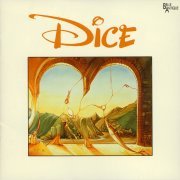 |
Dice (1978, 45.47) ****½/TTTT½Alea Iacta EstAnnika The Utopian Suntan The Venetian Bargain Follies Esther Labyrinth At the Gate of Entrudivore I'm Entrudivorian You Are? You Are... |
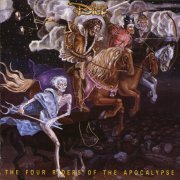 |
The Four Riders of the Apocalypse (1992, recorded 1977, 38.54) ****½/TTTT½ |
|
| War Ouverture Fronts Battle Deserted Battlegrounds Disease Greed |
Death Requiem Dance of the Devils Transition Heaven |
|
Current availability:
Mellotrons used:
Dice were a superb, if little-known Swedish band from the late '70s; they only released one album in their lifetime and neither of the above are easily available, even now. I spent most of Dice wondering where I'd heard the style before, until it suddenly hit me: Focus. Dice were the natural inheritors of the slightly jazzy, complex symphonic sound of Focus at their best, which is the sort of recommendation it's difficult to ignore, although the vocals are a tad unnecessary in places. What's more, the material's superb: The Utopian Suntan is a sardonic reflection on the subject of the destruction of the ozone layer, some years ahead of the general public's perception of the issue. As the sleeve notes say, "This is a catchy tune about epithelial cancer". Follies appears to be about schizophrenia, so you can hardly accuse Dice of not tackling the issues of the (or any) day; its long drawn-out coda consists of probably the slowest 'speed-up' I've ever heard, taking several minutes from the first perceptible pitch shift to the final high-speed squeak. Mellotron? Fucking everywhere.
The Four Riders of the Apocalypse was a mono demo recorded around 1977, remixed for stereo in the '90s. All instrumental, it's a superb piece of work; full-blown symphonic progressive, the material is melodic and memorable, unlike many of their more highly-rated contemporaries. The album's themes move through all the expected moods given the subject matter; stirring martial stuff in War and a rather doomy feel to the other three tracks, much Mellotron throughout from Leif Larsson. I recommend both albums highly, assuming you can find them. There's also a live album, Live Dice (****), recorded in 1979, but upon close scrutiny, it would appear to be entirely Mellotron-free.
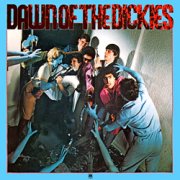 |
Dawn of the Dickies (1979, 29.35) ***½/½; |
|
| Where Did His Eye Go? Fan Mail Manny, Moe and Jack Infidel Zombie I'm a Chollo Nights in White Satin (I'm Stuck in a Pagoda With) Tricia Toyota I've Got a Splitting Hedachi |
Attack of the Mole Men She Loves Me Not |
|
Current availability:
Mellotron used:
The Dickies burst onto the moribund punk scene in 1979, spreading a little Californian sunshine with ridiculous covers of some of rock's sacred cows: Eve Of Destruction, Paranoid, The Sound Of Silence, Nights In White Satin, fer Chrissakes! Their debut album, The Incredible Shrinking Dickies, kept everything short and simple, despite having a keyboardist/saxophonist in the band in the form of Bob "Chuck Wagon" Davis, who tragically committed suicide a mere two years later. They followed up later the same year with Dawn of the Dickies, breaking the three-minute barrier on most tracks and allowing themselves a bit of leeway on the arrangement front, although the pace is largely still frantic throughout. Several tracks are clearly L.A. in-jokes - I mean, who outside Southern California knows what a chollo is? (A male of Hispanic descent, for what it's worth), but I think it's fair to say they're neither the first nor last band to write about their surroundings.
Chuck Wagon and possibly vocalist Leonard Graves Phillips are credited with Mellotron, amongst other keys, but you need bat-ears to hear it, to be honest. It could be mixed right in the background on a few tracks, but the only place I can even possibly spot it is on the album's, er, 'epic', Attack Of The Mole Men, with some background choirs, just about audible reverbing away as the track ends, but I'm really clutching at straws here. Not even anything on Nights In White Satin. Seriously, if it wasn't credited I'd have chucked this out (figuratively speaking) already; not a Mellotron classic, then...
Mike Dickson (UK) see: |
 |
 |
Notes (2003, 42.05) ***/T |
|
| Notes Break of Day Warm Sand Boys and Girls Poetess' Play Do Something Let's Get Lost Room With a View |
Too Much Undone Tenter Ground No. 5 So Long Hearts |
|
 |
Count to Ten (2007, 46.38) **½/T |
|
| Count to Ten On the Run Open Wide Night Cab You Know Better Sacre Coeur Craftsmanship and Poetry My Business |
Cruel to the Sensitive Kind Everybody Knows Night Cab (Epilogue) |
|
 |
A Beginning, a Detour, an Open Ending (2008, 74.43) ***/½ |
||
| He Doesn't Know Get to Know You In Love All I See Some Other Day Quarter to Forever No Time to Sleep |
Fallen Madonna Glow London Heaven and Hell Friend in a Bar The Road A New Situation |
Stains In Circles Walls Magic Security Check An Open Ending |
|
Current availability:
Mellotrons used:
Tina Dickow Danielsen is known as Tina Dico in all 'territories' (aargh! Music-biz speak!) other than her home, Denmark, presumably to aid dim foreigners in their pronunciation. 2003's Notes was her second album, a confessional singer-songwriter pop kind of thing, at its best on the dark Do Something, Let's Get Lost and Too Much. Martin Sommer plays Mellotron, with cellos (mixed in with sampled ones?) on Do Something and obviously Mellotronic cellos on Let's Get Lost. 2007's Count to Ten descends into Insipid Ballad Hell, sad to say, possibly at its least dull on the opening title track and Sacre Coeur. Dennis Ahlgren is credited with Mellotron, with upfront strings and cellos on Open Wide and pitchbent cellos on Sacre Coeur.
The following year's A Beginning, a Detour, an Open Ending began life as three EPs, recorded over 2007-8, only available at gigs. They were incorporated into the three-disc set with minor tracklist alterations, losing her cover of Bolland & Bolland's (let's forget about Status Quo's version, eh?) In The Army Now, replaced by Some Other Day. Mostly acoustic singer-songwriter fare, frequently tinged with folky touches, it's probably at its best on opener He Doesn't Know and the vocal-and-clean-electric-guitar In Love. Dennis Ahlgren plays Mellotron, with cellos on All I See, with nothing obvious, despite a credit, on disc three, An Open Ending.
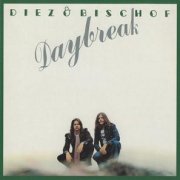 |
Daybreak (1975, 37.57) **½/½ |
|
| Daybreak Out of My Mind The Day Looks Good I Just Killed a Stranger Time Passed By Turnaround Skyman Stealing the Show |
Salon Imaginaire Stars in My Eyes |
|
Current availability:
Mellotron used:
To my knowledge, Frank Diez and Peter Bischof-Fallenstein only recorded the one album together, 1975's Daybreak, for which we should probably all be thankful. Given that this is sometimes labelled 'krautrock' (note 'current availability'), it's actually soft-rock hell, not even remotely progressive, let alone experimental. I won't deny it has its moments, not least the opening title track, the rock-ish Out Of My Mind and the quiet bits of Skyman, while gentle instrumental Salon Imaginaire isn't too bad, but the likes of The Day Looks Good and closer Stars in My Eyes drag the whole thing down.
Diez plays Mellotron choirs on Turnaround (doubled with real voices?), although the mawkish I Just Killed A Stranger features a fairly obvious string synth. Seriously, this barely scrapes that extra half star.
 |
Affinity (1995, 62.50) ***/0 |
|
| The Frankenhooker's Just Alive You Don't Know... C'mon Everybody How Can I Get Breakthrough? All Along the Night I Fly Wargus You Don't Know (Flash Back) Scarecrow |
Pillet Affinity |
|
Current availability:
Mellotron used:
The interestingly-spelled Differance were one of Masashi Kitamura's post-Ybo² projects, although I believe their last release predated his untimely death in 2006 by some years. Probably unsurprisingly, 1995's Affinity combines prog, avant-prog, funk, fucked-up rock'n'roll and a dozen other genres, to the point where every track sounds pretty much different to every other. Opener The Frankenhooker's Just Alive gives the impression that we're going to get an album of jamming hard rock, sort-of continued on You Don't Know..., but C'mon Everybody is Eddie Cochran as you've never heard him before, while You Don't Know (Flash Back) consists of no more than an insanely flanged guitar and psychedelic vocal effects and the closing title track sounds like something from side four of Physical Graffiti. And that's just half the LP...
Kitamura supposedly plays Mellotron on the last two tracks, but I'm not exaggerating when I say I'd love to know what and where. The faintest of faint strings on both? Who knows? Not me. One for fans of semi- (but only semi-) 'out there' Japanese psych-informed music, then, but not one for anyone wishing to hear some Mellotron.
See: Ybo²
 |
Fate's Going on (1999, 38.11) ***/T½ |
|
| Truce (I've Got) No Pictures of You Clay Feeling the World LifeIsAlrightWhenYerBlindToTheWorld Little Blue Pill Popular Halucinations Stripper |
Dawn What it Means In Other Hands |
|
Current availability:
Mellotron used:
For many years now, I've listed an EP by The Differents, 2000's This Year's Model, impossible to search for due to the slightly better-known title of the same name by Elvis Costello. Does it even exist? I must have found a reference to it somewhere, but, as is the way with the 'Net, things come and go and this seems to've gone. However, their full-length CD-R from the previous year, Fate's Going on, is on Bandcamp, a rock-end-of-indie release, at its best on opener Truce, (I've Got) No Pictures Of You and Feeling The World, perhaps.
Vocalist/guitarist Lou Hallwas plays real-sounding Mellotron (studio machine?), with chordal strings on Clay, a piercing flute line on Popular Halucinations [sic.] and low strings on What It Means, with extra points for not using the most obvious arrangements. So, what about that EP? Are some or all of its tracks all on this album and does that include the Mellotron ones? I've chucked it into the 'queries' section, but, should a reference to it ever appear, I'll take another look.
 |
Knuckle Down (2005, 57.14) ***/T½ |
|
| Knuckle Down Studying Stones Manhole Sunday Morning Modulation Seeing Eye Dog Lag Time Parameters |
Callous Paradigm Minerva Recoil |
|
Current availability:
Chamberlin used:
Angela "Ani" DiFranco (pron. 'Arnie') has been making records for twenty years now, 2005's Knuckle Down being something like her fourteenth. It hasn't exactly garnered universal praise from her fans, but then, these are probably the same people who berated the bisexual DiFranco for marrying (THE HORROR!) a man in 1998. To the uninitiated, it comes across as a slightly jazzy, slightly off-kilter modern singer-songwriter effort where, as is usual in this ragbag genre, the lyrics often take precedence over the music, although DiFranco's acoustic guitar work is one of the album's highlights, pushing genre boundaries harder than most of her contemporaries.
The ubiquitous Patrick Warren does his Chamberlin thing here, with subtle string interjections on Sunday Morning and Lag Time, plus flutes on Modulation, although you'd hardly call it one of the album's lodestones. Overall, then, a decent enough effort, assuming DiFranco's feminist message and unusual stylistic quirks are to your taste, although you're probably not going to bother for Warren's Chamby use.
See: Samples etc.
 |
God's Empty Chair (2001, 48.54) ***½/T |
|
| Find Your Own Way Cats in the Aviary Love Can Bathe My Heart Supplication One Robe One Bowl Susan Revolving God's Empty Chair |
Laudanum Cats in the Aviary (acoustic) |
|
Current availability:
Mellotron used:
Just for once, with regard to Santa Cruz native Becki DiGregorio, I agree with the online hagiographers; going by her second album, 2001's God's Empty Chair (a Kerouac quote), she really is at the superior end of the singer-songwriter spectrum. Album highlights include the stomping Cats In The Aviary, the powerpopish Love Can and the instrumental title track, but, if truth be told, there isn't a bad track here. What's her secret? I suspect the touch of psychedelia that pervades many of its tracks, lifting them well above the average. Would I be right in thinking she's never played Lilith Fair?
XTC's Dave Gregory plays (his own?) M400, with relatively unobtrusive strings on One Robe One Bowl, which still manage to leave their mark. I'm not trying to claim Joni Mitchell-esque greatness for Ms. DiGregorio, but this is a fine album. Worth hearing.
 |
Suite Per Una Donna Assolutamente Relativa (1972, 40.55) ***½/TT |
|
| Donna Paesaggio Il Viso Il Cuore Intermezzo La Cattedrale dell'Amore Le Gambe Suite Relativa Monti e Valli |
I Sogni La Notte Sintesi |
|
Current availability:
Mellotron used:
I Dik Dik are yet another of the legions of early-'70s progressive bands in Italy, many of who released just one or maybe two poorly-selling albums. Like many others, they came from the '60s beat scene, later descending back into commercialism, leaving (deep breath) Suite Per Una Donna Assolutamente Relativa as their sole progressive legacy. It appears to be a concept album, although I've no idea what the concept may actually be; whether the cleaning lady on the cover is involved can only be a matter for conjecture, until someone enlightens me. The music is the usual highly melodic, keyboard-driven prog, probably somewhere in the middle of the quality range, so 'good, without being outstanding'.
Difficult to say precisely, but I believe the Mellotron was played by longstanding keys man Mario Totaro; sounds like an M300, though it's hard to tell. Mostly, he used it for background strings, though there's a Mellotron flute intro on Il Cuore and a more upfront strings part on La Cattedrale Dell'Amore, although it has to be said, some of the string parts sound more like a string section than a Mellotron.
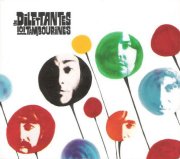 |
101 Tambourines (2007, 47.51) ***/TT |
|
| Ready to Go Subterranean Bazaar Brightly Lit New Dark Ages Don't You Ever Fall The Whole World You're Gonna Need More Time Like Crazy |
Marzipan Never Go Without Everlasting Low Kiss & Run What Were You Thinking? |
|
Current availability:
Mellotron used:
In 101 Tambourines, The Dilettantes, 'partly led' by The Brian Jonestown Massacre's Joel Gion, have produced an album of two halves, excellent, powerpop-into-psych stuff like opener Ready To Go, the Byrdsian Brightly Lit New Dark Ages and Like Crazy being held back by the likes of You're Gonna Need More Time or the dreary, overlong Never Go Without.
Ben Ipekjian plays real-sounding Mellotron on three tracks, clustered together in the middle of the album, with reverbed-to-fuck strings opening Like Crazy, also appearing later in the track, with more of the same on Marzipan and Never Go Without; note the distinctive 'choked off' note on the last-named. I don't believe the band recorded again; a shame, as they could have produced a classic if they'd had another try.
See: Joel Gion
 |
Don't Lie to the Band (1976, 44.38) ***/T½Two Time LoveTaxman It's Not All Mine Munchkin Men You Lied Robot Race Coming Home Bumpadidilly |
Current availability:
Mellotron used:
I don't know if Dillinger suffered comparisons with the contemporaneous reggae singer, but I've always confused them with Derringer, although the names aren't that similar. Their eponymous debut album sounds like it could be quite interesting, featuring a side-long piece, but their second and last effort, Don't Lie to the Band, despite frequently being referred to as 'progressive', is a rather middling, straightforward rock album with only slight progressive leanings. The best tracks tend to be the longest (big surprise there), with top marks going to Coming Home and Munchkin Men, despite the rather unfortunate 'Munchkin chorus' that crops up halfway through.
Vocalist/keys man Jacques Harrison adds Mellotron to a handful of tracks, with not especially forceful string parts on their cover of Spooky Tooth's Two Time Love, Munchkin Men and Coming Home, plus cellos on the latter. Overall, an OK album, but is 'OK' good enough? With so much great music out there, you probably don't need to put this too high on your 'wants' list. Incidentally, the band eventually morphed into hard rock crew The Hunt, although no members played on their 'Mellotron Album', Back on the Hunt.
See: The Hunt
 |
Nobody's Sweetheart (2003, 53.10) ***½/T |
|
| Feel the Way I Do It Must Be Love The Stain Shoreline Let's Go for a Drive A Girl Like Me Honeymoonee The Silent You |
Nobody's Sweetheart Now You're Mine Can't Make You Stay Don't Blame You Now Mamma's Backyard |
|
Current availability:
Mellotron used:
Sandy Dillon's an American singer-songwriter who relocated to the UK after recording two unreleased albums. She married a British guitarist, Steve Bywater and made several albums with him before his untimely death in 2001. 2003's Nobody's Sweetheart is her first subsequent album and is, unsurprisingly, full of songs of regret and longing. So far, so what? What lifts her above her contemporaries is a refusal to play the game and make bland, pointless music to which lonely young women can relate, opting instead for a more individual vision and abrasive sound; even the quieter tracks sound somewhat on the tortured side (note: this is a good thing...).
Dillon herself plays Mellotron on two tracks, with (sorry) ethereal strings on Let's Go For A Drive and something completely inaudible on Can't Make You Stay. So; an unusual, individual album to which you could still loosely attach the 'singer-songwriter' tag, although its Mellotronic input is fairly low. Worth hearing anyway.
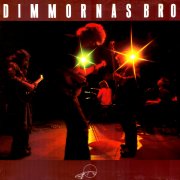 |
Dimmornas Bro (1977, 38.19) ***½/TLåt det Inte Gå ut Över MigGullänget Romeo Grisflykten Fängelset Skolan Alltså Och Sen Då..... Waldos Hotell Nånting Sällsamt |
Current availability:
Mellotron used:
Dimmornas Bro (named for what appears to be the Swedish title for the 1940 film Waterloo Bridge) were a late '70s Swedish pop/prog outfit, whose eponymous debut is actually rather better than that sounds. Admittedly, material such as opener Låt Det Inte Gå Ut Över Mig, Grisflykten and Fängelset Skolan Alltså have rather too much of the sub-Kayaks about them, but acoustic guitar instrumental Gullänget and the two (relatively) full-on prog numbers, Romeo and Nånting Sällsamt, are well worth hearing. The overall effect should be irritating, but the band manage to transcend their commercial inclinations well enough to make for a decent listen several decades later.
Staffan Hellstrand's string synth provides most of the album's strings work, but we're definitely hearing a Mellotron on a couple of tracks, with flutes on Romeo, a high string line and flutes on Och Sen Då..... and a barely-audible strings pitchbend at the end of Nånting Sällsamt to close the album. This doesn't seem to be on CD (not prog enough for Mellotronen or Record Heaven?), but the whole album's up on YouTube. A (very) cautious recommendation, then.
See: Staffan Hellstrand
 |
Pat DiNizio (2007, 29.31) ***½/T½ |
|
| Since You Went Away Night Without Sleep Wonderful Any Other Way I Need You Dear World Love Sometimes |
You Said Don't Look Now |
|
Current availability:
Mellotron used:
Pat DiNizio is mainman of New Jersey's Smithereens, concurrently running a sporadic solo career, 2007's ludicrously short eponymous release being his third in a decade. When I say 'short', I mean (as you can see) 'under half an hour', some tracks actually fading before you feel they're done, which makes for an unusual turnaround from the more typical scenario. Unlike DiNizio's previous solo efforts, apparently, this is not dissimilar to his work with his main outfit, top tracks including opener Since You Went Away, the raucous Wonderful, Any Other Way and closer Don't Look Now, but not only does he appear to be incapable of writing a bad song, but the album's short enough to suggest self-editing, so maybe we're simply not getting to hear the second-rate stuff.
Kurt Reil plays Mellotron (as he does with The Smithereens), with strings on Since You Went Away and Sometimes, presumably from a real M400. Pat DiNizio is a fine album, fearlessly melodic and uncompromisingly powerpop; if you just can't get enough jangle for your jingle (huh?), apply here.
See: Smithereens
 |
The Great Pretender (1974, 38.06) **½/T |
|
| The Great Pretender Jamaica Yellow Rose Express Sunday Morning Fool Last Dance in Salinas Tattooed Man From Chelsea Woman of Aran Pentacott Lane |
Icarus Texas Knight |
|
Current availability:
Mellotron used:
Although the intriguingly-named Michael Dinner began his career as a country singer, he subsequently moved into film production, finally finding success in that area. His first album (of two), 1974's The Great Pretender, is a proper, trad country release, of the kind that can sell millions with the right promotion. However, given that he was signed to the same label as Creedence Clearwater Revival, Fantasy, maybe we shouldn't be too surprised that this record effectively sank without trace. It occasionally deviates from the country template, notably on the rocking Tattooed Man From Chelsea and the country/blues of Woman Of Aran, its best tracks probably being the aforementioned Tattooed Man... and epic country closer Texas Knights.
John Boylan plays Mellotron on two tracks, with string parts on Icarus and Texas Knight, that sound, although the album features names of the calibre of Linda Ronstadt, Andrew Gold and pedal-steel god "Sneaky Pete" Kleinow, like an attempt to substitute for a real string section. Anyway, if you don't like mainstream country, you're probably not going to want to hear this, but it does what it does well and avoids most of the horrid Nashville clichés of the era.
 |
Green Mind (1991, 41.33) ***½/TWagonPuke + Cry Flying Cloud How'd You Pin That One on Me Water Muck Thumb Green Mind Blowing it/I Live for That Look |
 |
Without a Sound (1994, 45.58) ***/½ |
|
| Feel The Pain I Don't Think So Yeah Right Outta Hand Grab it Even You Mind Glow Get Out of This |
On the Brink Seemed Like the Thing to Do Over Your Shoulder |
|
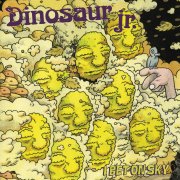 |
I Bet on Sky (2012, 47.03) ***/T |
|
| Don't Pretend You Didn't Know Watch the Corners Almost Fare Stick a Toe in Rude I Know it Oh So Well Pierce the Morning Rain What Was That |
Recognition See it on Your Side |
|
Current availability:
Mellotrons used:
1991's Green Mind was Dinosaur Jr's first album after the major schism within the band, bassist Lou Barlow (Sebadoh) now history and drummer Murph only making a minor contribution to the record. It was also their first for a major, but you could hardly accuse them of selling out as it kicks off with the furious Feel The Pain, mixing pop and punk in a way wholly different to then-new acts such as Green Day or The Offspring, but strangely rather akin to Hüsker Dü, already several years gone. Mellotron credited on two tracks, from Sean Slade, although whatever might be on Water is completely inaudible. Thumb is another matter, however... It opens with an unaccompanied Mellotron flute part, which then keeps up all the way through the song, mixed high enough to be clearly audible over the band. Marvellous!
'94's Without a Sound, not dissimilar to Green Mind, finds J. Mascis still channelling Neil Young. it's another set of melodic post-hardcore, although the then-prevalent grunge movement should have worked more to their advantage than it did. Its sole Mellotron track is the album's first ballad, Outta Hand, with some distant strings cropping up here and there, but it's far from essential, particularly when compared to Thumb. After Mascis' sample use on '97's Hand it Over (here), it was another fifteen years before the reformed original lineup used anything Mellotronic again. 2012's I Bet on Sky is a decent enough release, perfectly matching the description that titled a 2001 compilation: 'ear-bleeding country'. Better tracks include opener Don't Pretend You Didn't Know, the slower Stick A Toe In and Pierce The Morning Rain, while Recognition stands out for its herky-jerky chorus rhythm. Even more than on their early albums, it's really noticeable what a massive debt they owe to Neil Young, without whom, quite simply, they wouldn't have a career. Mascis plays what sounds quite like real Mellotron strings on Don't Pretend You Didn't Know, but they're hardly a defining feature of the album.
See: Samples etc. | Mike Johnson | Sebadoh